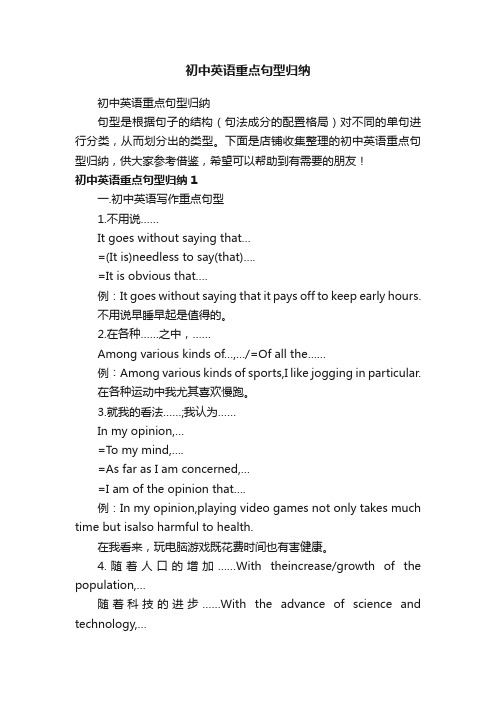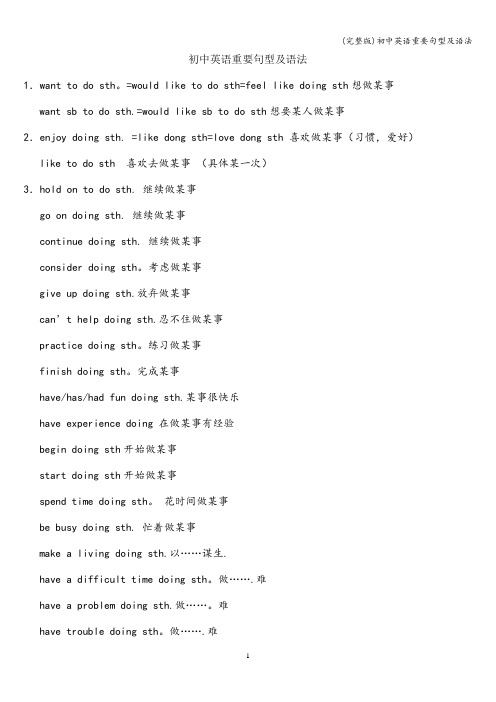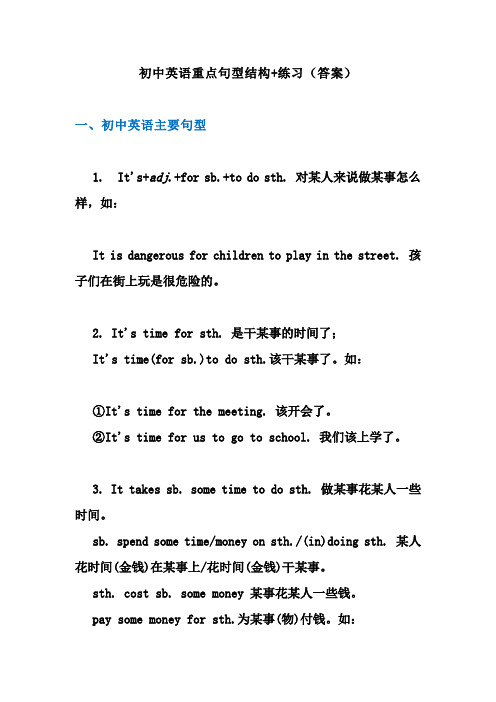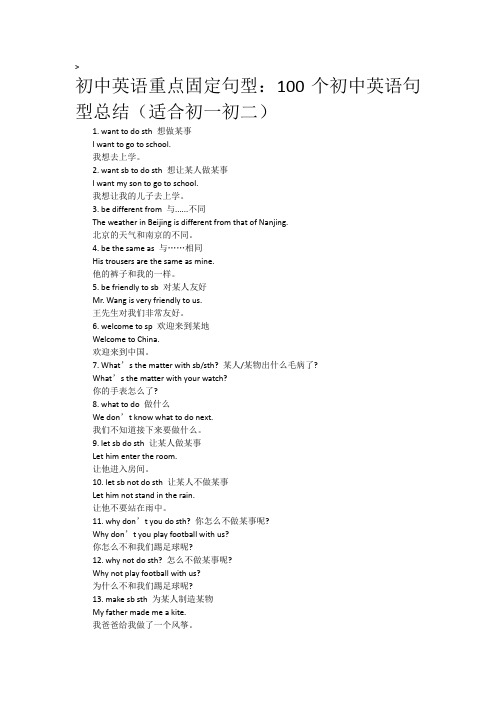初中英语重点句型
初中英语重点句型归纳

初中英语重点句型归纳初中英语重点句型归纳句型是根据句子的结构(句法成分的配置格局)对不同的单句进行分类,从而划分出的类型。
下面是店铺收集整理的初中英语重点句型归纳,供大家参考借鉴,希望可以帮助到有需要的朋友!初中英语重点句型归纳1一.初中英语写作重点句型1.不用说……It goes without saying that…=(It is)needless to say(that)….=It is obvious that….例:It goes without saying that it pays off to keep early hours.不用说早睡早起是值得的。
2.在各种……之中,……Among various kinds of…,…/=Of all the……例︰Among various kinds of sports,I like jogging in particular.在各种运动中我尤其喜欢慢跑。
3.就我的看法……;我认为……In my opinion,…=To my mind,….=As far as I am concerned,…=I am of the opinion that….例:In my opinion,playing video games not only takes much time but isalso harmful to health.在我看来,玩电脑游戏既花费时间也有害健康。
4.随着人口的增加……With theincrease/growth of the population,…随着科技的进步……With the advance of science and technology,…例:With the rapid development of Taiwan’s economy,a lot ofsocial problems have come to pass.随着台湾经济的快速发展许多社会问题产生了。
(完整版)初中英语重要句型及语法

初中英语重要句型及语法1.want to do sth。
=would like to do sth=feel like doing sth想做某事want sb to do sth.=would like sb to do sth想要某人做某事2.enjoy doing sth. =like dong sth=love dong sth 喜欢做某事(习惯,爱好)like to do sth 喜欢去做某事(具体某一次)3.hold on to do sth. 继续做某事go on doing sth. 继续做某事continue doing sth. 继续做某事consider doing sth。
考虑做某事give up doing sth.放弃做某事can’t help doing sth.忍不住做某事practice doing sth。
练习做某事finish doing sth。
完成某事have/has/had fun doing sth.某事很快乐have experience doing 在做某事有经验begin doing sth开始做某事start doing sth开始做某事spend time doing sth。
花时间做某事be busy doing sth. 忙着做某事make a living doing sth.以……谋生.have a difficult time doing sth。
做…….难have a problem doing sth.做……。
难have trouble doing sth。
做…….难keep on doing sth. = keep sb. doing sth。
不停地做某事4.be good at doing sth 擅长于做某事do well in doing sth擅长于做某事thank you for doing sth 感谢做某事thanks for doing sth感谢做某事be used for doing sth 被用于做某事be used to doing sth 习惯做某事how about doing sth 做某事怎样what about doing sth 做某事怎样put off doing sth推迟做某事take pride in doing sth.以……为自豪by doing sth通过做某事be afraid to do sth害怕做某事be afraid of doing sth害怕做某事be terrified of doing sth. 害怕做某事5.be doing sth。
人教新目标初中英语重点句型

初中英语重点句型1.It’s +adj. +for sb. + t o do sth. 对某人来说,做某事是。
eg. It’s quite important for students to care and protect their eyes.对学生来说,关心和保护眼睛是相当重要的。
It’s necessary for us to le arn from others.对我们来说,向他人学习很有必要。
2.It’s +adj.+of sb.+to do sth. 某人做某事真是。
的。
eg. It’s foolish of her to make such mistakes.她犯这样错误真是愚蠢。
It’s very k ind of you to help me so much.你帮我那么多真太好了。
3.Doing sth. is +adj. +for sb. 做某事对某人是。
的。
eg.Eating more fruit and vegetables is good for our health.多吃水果蔬菜有益健康。
Giving up smoking is not easy for my father.戒烟对我爸爸来说不容易。
4.It + take +sb. + time + to do sth..做某事花费某人时间。
eg.It took me half an hour to arrive at the airport yesterday.昨天到达机场花了我半小时。
How long does it take you to get to school on foot every day?你每天走路上学用多长时间?5. It seems/seemed that....好像。
eg. It seems that many people all over the world drink Chinese tea.好像全世界许多人喝中国茶。
初中英语学习必背的62个句型,句句经典!

句型1:There+be +主语+地点状语/时间状语 There’s a boat in the river. 河里有条船。
句型2:What’s wrong with+sb./sth.? What’s wrong with your watch? 你的手表有什么毛病? 句型3:How do you like...? How do you like China? 你觉得中国怎么样? 句型4:What do you like about...? What do you like about China?你喜欢中国的什么? 句型5:had better(not)+动词原形 You’d better ask that policeman over there. 你最好去问问那边的那个警察。
句型6:How+adj. / adv. +主语+谓语! What a/an+adj. +n. +主语+谓语! How cold it is today ! 今天多冷啊! What a fine picture it is! 多美的一幅图画呀! 句型7:Thank+sb. +for (doing) sth.Thank you for coming to see me. 感谢你来看我。
句型8:So+be/ 情态动词/ 助动词+主语 He is a student. So am I. 他是一个学生,我也是。
句型9:... not ... until ... He didn’t have supper until his parents came back. 直到他的父母回来他才吃饭。
句型10:比较级+and+比较级 The baby cried harder and harder. 那孩子哭得越来越厉害。
句型11:the +比较级,the +比较级 The more one has,the more one wants. 越有越贪。
初中英语重点句型结构

初中英语重点句型结构+练习(答案)一、初中英语主要句型1. It's+adj.+for sb.+to do sth. 对某人来说做某事怎么样,如:It is dangerous for children to play in the street. 孩子们在街上玩是很危险的。
2. It's time for sth. 是干某事的时间了;It's time(for sb.)to do sth.该干某事了。
如:①It's time for the meeting. 该开会了。
②It's time for us to go to school. 我们该上学了。
3. It takes sb. some time to do sth. 做某事花某人一些时间。
sb. spend some time/money on sth./(in)doing sth. 某人花时间(金钱)在某事上/花时间(金钱)干某事。
sth. cost sb. some money 某事花某人一些钱。
pay some money for sth.为某事(物)付钱。
如:① It took me two hours to write the letter. 写这封信花了我两小时的时间。
②He spends half an hour(in)reading English every morning.他每天早上花半小时读英语。
③ He spends one hour on the housework every day. 他每天花一小时做家务。
④ The bike cost me 500 yuan. 这辆自行车花了我500元。
⑤ I spent 500 yuan on the bike. 我买这辆自行车花了500元。
⑥ I paid 500 yuan for the bike. 我花了500元买这辆自行车。
初中英语重点固定句型

>初中英语重点固定句型:100个初中英语句型总结(适合初一初二)1. want to do sth 想做某事I want to go to school.我想去上学。
2. want sb to do sth 想让某人做某事I want my son to go to school.我想让我的儿子去上学。
3. be different from 与......不同The weather in Beijing is different from that of Nanjing.北京的天气和南京的不同。
4. be the same as 与……相同His trousers are the same as mine.他的裤子和我的一样。
5. be friendly to sb 对某人友好Mr. Wang is very friendly to us.王先生对我们非常友好。
6. welcome to sp 欢迎来到某地Welcome to China.欢迎来到中国。
7. What’s the matter with sb/sth? 某人/某物出什么毛病了?What’s the matter with your watch?你的手表怎么了?8. what to do 做什么We don’t know what to do next.我们不知道接下来要做什么。
9. let sb do sth 让某人做某事Let him enter the room.让他进入房间。
10. let sb not do sth 让某人不做某事Let him not stand in the rain.让他不要站在雨中。
11. why don’t you do sth? 你怎么不做某事呢?Why don’t you play football with us?你怎么不和我们踢足球呢?12. why not do sth? 怎么不做某事呢?Why not play football with us?为什么不和我们踢足球呢?13. make sb sth 为某人制造某物My father made me a kite.我爸爸给我做了一个风筝。
初中英语重要的60个句型

初中英语重要的60个句型在初中英语学习阶段,句型和语法、词汇、短语一样重要。
掌握一些核心句型,对于学习和考试可以起到事半功倍的效果,写作文时也不会再发愁句子该怎么写了!句型1:There+be +主语+地点状语/时间状语There’s a boat in the river.河里有条船。
句型2:What’s wrong with+sb. / sth. ?What’s wrong with your watch?你的手表有什么毛病?句型3:How do you like...?How do you like China?你觉得中国怎么样?句型4:What do you like about...?What do you like about China?你喜欢中国的什么?句型5:had better(not)+动词原形You’d better ask that policeman over there.你最好去问问那边的那个警察。
句型6:How+adj. / adv. +主语+谓语! ;What a/an+adj. +n. +主语+谓语! How cold it is today !今天多冷啊!What a fine picture it is!多美的一幅图画呀!句型7:Thank+sb. +for (doing) sth.Thank you for coming to see me.感谢你来看我句型8:So+be/ 情态动词/ 助动词+主语He is a student. So am I.他是一个学生,我也是。
句型9:... not ... until ...He didn’t have supper until his parents came back.直到他的父母回来他才吃饭。
句型10:比较级+and+比较级The baby cried harder and harder.那孩子哭得越来越厉害。
初中英语重点句型100个

初中英语重点句型100个1、Welcome back to… eg. Welcome back to school/the factory. Welcome back home.2、It is much better than having class3、Some of the apples are hard to reach.4、Work must come first.5、The other students in the class keep their eyes closed例如:Don't keep your mother waiting Keep the students in/out.6、You had better stay at home.7、You'd better stay at hom, hadn't you? You'd better not stay at home.8、Walk(Go) along、down the road/street, and take the first turning on the left. =Turn left at the first turning9、We live in a place named Da Lian.10、I like to keep busy.11、Better late than never.12、There was a telephone call for you. Here is a letter for you.13、Thank a lot/very much/you for asking me to your party.14、Which is t he way to….?=How can I get to/reach/arrive in(at)/find….? Is there a …..near here?=Where is the…..?=Could you tell me the way to…..?15、It's too dangerous to cross the street. ( He is too young to go to school=He isn't old enough to go to school.=He is s o young that he can’t go to school.)16、the Read family= the Reads=Mr. and Mrs. Read17、the way you speak.18、He is on a visit to England.19、Come out for a walk in the park.20、I can wear it in my new hat.22、It was a pleasure ( for me).= With pleasure.21、The book cost me five yuan. I paid five yuan for the book.23、We won't go until we get it back again.(Wait until we come back)24、Chocolate is good for your heath25、Do you think it is good to do some housework?26、Either mum or I cook supper.27、Neither Dad nor my brother helps.28、Why don't men do a bit of housework?29、May I take your orders now?30、Could we have the bill?31、China is very famous for its food in the world. The poem was famous as Li Bai.32、Take the second turning on the left= Turn left at the second crossing.33、Either (Neither) of the answers is right.34、I like the film, and so dose he. (He likes the film. So he does.)35、We have to get up early in the morning =We have to be up early in the morning.36、How did he make the baby stop crying? (see ,watch, look at, notice,hear, listen to, feel ,make let ,have, help) eg. I saw her go into the house. Let me go. We noticed him come out . She was seen to go into the house.37、He told me not to bring you anything?38、finish+doing enjoy +doing be busy +doing practise +doing feel like+ doing… have fun doing sth. Can't help, be worth,He finished doing his homework. We are busy making some kites. We are going to have fun learning and speaking English this term.39、stop doing sth./stop to do sth. remember doing sth./remember to do sth. forget doing sth./forget to do sth. Eg. She stopped crying. She stopped to cry. I remember posting the letter.. I remember to post the letter. I forgot doing my homework. I forgot to do my homework.40、There are three girls walking in the park.41、We are going to have fun learning and speaking English this term.42、They have (get) some problems (difficulty) (in) doing sth.43、I don't know where he comes=I don't know. Where does he come?44、Do you know if/whether he got up early yesterday morning?= Do you know? Did he get up early yesterday morning?45、Why don't you wait for me here? = Why not wait for me here?46、He likes swimming in summer. He likes to swim.47、He found it very difficult to sleep./I think it very important to learn English well.( make,feel)48、I little (never,) dreamt of (about) seeing you here.49、I little (never) dreamt that I saw you here.50、I have been to the factory. He has gone to the factory.51、I have been in the factory for two years.52、It takes/took/will take sb. st. to do sth. eg. It took me an hour and a half to work out the difficult problem. It takes me one and a half hours to go to school on foot.53、I have two brothers. One is a worker.. The other is a doctor.54、There are lots of children playing in the park. Some are singing. Others are playing games.55、There are fifty students in our class. Thirty are girls. The others are boys.56、Let's make it 8:30/a little/a bit earlier57、He is as tall as I/me. He doesn't run as、so fast as I/me.58、He is interested in the film. The film is interesting.59、Not everyone likes sandwich.= Everyone doesn't like sandwich. Everyone likes sandwich. No one likes sandwich/None(None of them) like(s) sandwich.60、I don/t think he is right, is he? He doesn/t think you are right, does he? ( think, guess, except, suppose, imagine, believe.)61、There is little water in the bottle, is there/There is a little water in the bottle, isn't there? There are few books on the table, are there? There are a few books on the table, aren't there?62、Do you have one more to say? There are another three mooncakes left. Do you have one more to eat?63、The lights are still on. He must be at home, isn't he? He must have come here yesterday, didn't he?64、Do you mind my opening the door?65、Everybody is looking forward to May Day with great joy.66、He can't help crying.67、I am a student , aren't I?68、What's he?=What does he do?=What's his job?69、Jim is short for James70、Help yourselves to some grapes and watermelons.71、We often go on a picnic/our first field trip/a long journey to the west of China. 72、I often see some students at school talking to each other in English.(see, find, watch, hear)73、Sometimes we find them driving the tractors on the farm.74、I think every minute counts.75、He was unhappy, wasn't he?76、He used to get up early, didn't/usedn't he? He didn't use to get up early. Did he use to get up early? = Used he to get up early? He is used to getting up early, isn't he? He isn't used to getting up early.77、He eats too much food so he grows fatter and fatter. The book is much too expensive78、Give me a book=Give a book to me. Show him a spade= Show a spade to him. (tell, hand, bring, return, send ,leave, offer pass, cause)80、He who does not work neither shall he eat.81、I'll have、get my hair cut.82、Will you please say it again more slowly?83、The wall needs/wants painting. The wall wants to be painted.84、What can I do for you?= Can/May I help you?85、Hurry up, and you'll get there in time.= If you hurry up, you'll get there in time. 86、Hurry up, or you'll be late for school. = If you don't hurry up, you'll be late for school.87、Neither answer you have given is right88、Lin Tao didn't know anything about it, neither/nor did Tom.89、I didn't know anything about it. Tom didn't know anything about it, either.90、He has come here, and so have I. I have also come here. I have come here, too 91、He goes there, and so do I. I also go there. I go there ,too.92、He is a student, and so am I. I am also a student. I am a student ,too.93、In Britain, sales of cigarettes have been reduced by 30% in the last ten years. During the past two years, I have learned 2000 English words94、The number of the students has reached 1700.95、A number of the students have come here already.96、It's a mistake for you to go there at night.97、It's very kind of you to help me.98、The number of the students has reached 1700.99、A number of the students have come here already.100、It's a mistake for you to go there at night.101、It's very kind of you to help me.102、What's wrong with you?=What's the matter with you?=What's your trouble? 103、He comes from Hennan.=He is from Hennan.104、What's the time?=What time is it (by your watch)?105、Whose shirt is it?=Whose is this shirt?106、What's in a name?108、I can't help laughing at the news. I can’t help to carry that heavy box for you. 109、I regretted saying so much words at the meeting. I regretted to tell you about it. 110、I tried making the kite yesterday. I tried to work out the maths problem yesterday.111、You must keep your son from going there. You can't keep your mother waiting there so long. 112、She preferred singing to dancing. She preferred him to go home. She preferred to stay at school rather than go home. She preferred to go shopping after school.113、I spent two days in doing my homework. I spent five yuan on that book.。
- 1、下载文档前请自行甄别文档内容的完整性,平台不提供额外的编辑、内容补充、找答案等附加服务。
- 2、"仅部分预览"的文档,不可在线预览部分如存在完整性等问题,可反馈申请退款(可完整预览的文档不适用该条件!)。
- 3、如文档侵犯您的权益,请联系客服反馈,我们会尽快为您处理(人工客服工作时间:9:00-18:30)。
初中重点句型*掌握.应用于作文与翻译.要求背诵理解1.I think…意为“我认为……”,是对某人或某事的看法或态度的一种句型。
其否定式常用I don’t think…,2.give sth. to sb./ give sb. sth. 意为“把……给……”,动词give之后可接双宾语,可用这两种句型;若指物的宾语是人称代词时,则只能用give it/ them to sb. 3.take sb./ sth. to…意为“把……(送)带到……”,后常接地点,也可接人。
4.One…, the other…/One is…and one is…意为“一个是……;另一个是……”,必须是两者中。
5.Let sb. do sth. 意为“让某人做某事”,人后应用不带to的动词不定式,其否定式为Don’t let sb,do sth.,或Let sb. not do sth. 另外,Let’s 与Let us的含义不完全相同,前者包括听者在内,后者不包括听者在内,6.help sb. (to) do sth./help sb. with sth.意为“帮助某人做某事”,前者用不定式作宾补,后者用介词短语作宾补,二者可以互换.7.What about…?/How about…?意为“……怎么样?”是用来询问或征求对方的观点、意见、看法等。
about为介词,其后须接名词、代词或V-ing等形式。
8.It’s time to do…/ It’s time for sth. 意为“该做……的时间了”,其中to后须接原形动词,for后可接名词或V-ing形式。
9.like to do sth./like doing sth.意为“喜欢做某事”,前一种句型侧重具体的一次性的动作;后一种句型侧重习惯性的动作,10.ask sb.(not) to do sth. 意为“让某人(不要)做某事”,其中ask sb.后应接动词不定式,11.show sb. sth. / show sth. to do. 意为“把某物给某人看”,该句型的用法同前面第2点。
12.introduce sb. to sb. 意为“把某人介绍给另一人”;introduce to sb.则是“向某人作介绍”。
13.So + be/助动词/情牵动词/主语.前面陈述的肯定情况也适于另一人(物)时,常用到这种倒装结构,表示“另一人(物)也如此。
”前面陈述的否定情况也适于另一人(物)时,常用“Neither/ Nor + be/助动词/情态动词+主语.”这种倒装结构。
注意:“So+主语+be/助动词/情态动词.”这一句型常用于表示赞同,进一步肯定对方的看法,表示“的确如此。
”“是呀。
”14.Turn right/left at the first/second/…crossing.这一指路的句型意为“在第一/二/……个十字路口向右/左拐。
”相当于Take the first /second/…turning on theright/left.15.It takes sb.some time to do sth.此句型表示“干某事花了某人一段时间。
”其中的it是形式主语,后面的动词不定式(短语)才是真正的主语.16.…think/find + it + adj. + to do sth.此句型中的it是形式宾语,不可用其它代词替代,形容词作宾语的补足语,后面的动词不定式(短语)才是真正的宾语。
17.What’s wrong with…?此句型相当于What’s the matter/ trouble with…?后跟某物作宾语时,意为“某物出什么毛病了?”后跟某人作宾语时,意为“某人怎么了?”18.too…to…在so…that…复合句中,that后的句子是否定句时,常与简单句too…to…(太……而不能……)进行句型转换。
在so…that…复合句中,that后的句子是肯定句时,常与简单句…enough to…进行句型转换.19.Sorry to hear that.全句应为I’m sorry to hear th at. 意为“听到此事我很难过(遗憾)。
”常用于对别人的不幸表示同情、遗憾之意。
20.She used to be a Chinese teacher. 她过去是一位汉语老师。
[用法] used to + 动词原形,表示过去经常性的动作或存在的状态,含有现在不再如此之意。
[搭配] used to do的否定式可以是usedn’t to do或didn’t use to do.[比较] used to do sth. 过去常做某事;be/ get used to doing sth. 习惯于做某事;be used to do sth. 被用来做某事。
21.…return it sooner or later.……迟早要将它归还。
[用法] l)sooner or later意为“迟早”、“早晚”。
2)return此处用作及物动词,意为“归还”,相当于give back.[拓展]return还可用作不及物动词,意为“返回”,相当于go back或come back。
22 . No matter what the weather is like…无论天气……[用法]no matter what 相当于whatever,其意为“无论什么”,引导状语从句。
[拓展]类似no matter what的表达方式还有:no matter when无论什么时候nbsp; nbsp;nbsp;no matter where无论什么地方no matter who无论谁no matter how 无论怎么样23. A young man practised speaking English with Mr. Green.一位年经人与格林先生练习讲英语。
[用法]practise doing sth. 表示“实践、练习(做)某事”。
[拓展]practice名词,“实践”、“实施”、“练习”;put a plan into practice实行某计划。
24. He encouraged everyone to take part in protecting our lakes, rivers, seas and oceans.他鼓励大家参加保护我们的湖泊、河流和海洋的活动。
[用法]1)encourage用作动词,意思是“鼓励”、“支持”。
2)take part in“参加”,常表示参加活动。
3)protect 是动词,表示“防御”、“保护”。
[搭配]1)encourage sb. in sth.在某事上鼓励或支持某人nbsp;encourage sb. to do sth.鼓励某人干某事2)protect sh. from sth.使某人不受某事侵袭或伤害25. …to warn people about sharks in the water. ……警告人们当心水里的鲨鱼。
[用法] warn用作动词,意思是“警告”、“警戒”。
[搭配]1)warn sb.+ that从句2)warn sb. of sth. 警告某人某事3)warn sb. to do sth.告诫某人做某事4)warn sb. against(doing) sth.告诫某人当心某事/不要做某事重点句型、词组大盘点 1. She used to be a Chinese teacher. 她过去是一位汉语老师。
[ 用法] used to + 动词原形,表示过去经常性的动作或存在的状态,含有现在不再如此之意。
[ 搭配] used to do的否定式可以是usedn’t to do或didn’t use to do. [ 比较] used to do sth. 过去常做某事;be/ get used to doing sth. 习惯于做某事;be used to do sth. 被用来做某事。
……附录:要求背诵as soon as 一…就…as…as… 与… as…as possible 尽可能… ask sb. for sth. 管某人要某物ask/tell sb. (how) to do sth.1.要求某人做某事(无how)2.问/告诉如何做某事(有how)ask/tell sb. not to do sth. 要求某人不要做某事be afraid of doing sth./ that…1. be afraid of doing sth. 害怕做某事2. be afraid that… 恐怕…/担心…(that可省略)be busy doing sth. 忙于做某事be famous/ late/ ready/ sorry for…1.be famous for… 因…而出名2.be late for… ...迟到例be late for school 上学迟到3.be ready for… 为…做好准备4.be sorry for… 为…感到抱歉be glad that… 为…感到高兴buy/ give/ show/ bring/ lend/ send/ pass/ tell sth to sb. (=……sb sth)1.buy sth to sb. 给某人买某物2.give sth to sb. 给某人某3.show sth to sb. 给某人展示某物4.bring sth to sb. 给某人带某物5.lend sth to sb. 借给某人某物6.send sth to sb. (寄)给某人某物7.pass sth to sb. 递给某人某物8.tell sth to sb. 告诉某人某事either …or… 要么…要么…enjoy/ hate/ like/ finish/ stop/ mind/ keep/ go on doing sth享受于/憎恶/喜爱/完成/停止/介意/保持/继续做某事find it + adj. to do sth. 发现做某事是…的(=find that it is + adj. to do sth. )get +比较级变得更…get ready for/ get sth. ready1.get ready for 为…做准备(=prepare for)2.get sth. ready 准备好某物had better (not) do sth 最好(不)做某事help sb. (to) do / help sb. with…1.help sb. (to) do 帮助某人做某事2.help sb. with… 在某方面帮助某人I don't think that… 我认为…不…(that可省略否定前置)I would like to/ Would you like to... 我想要…/你想…么is one of the +最高级+名词复数最…的…之一It is +adj. for sb. to do sth. 做某事对于某人来说…It is a good idea to do sth. 做某事是个好主意It is the second +最高级+名词第二…的…It looks like…/ It sounds like… 这看起来像…/这听起来像… It seems to be/that… ...好像...It sounds +adj./ It looks+adj. 这看起来…/这听起来…It's bad/ good for … 这对…来说不好/好It's time for sth./ to do sth. 到了…/做…的时间了It's two meters(years)long (high, old) 这有两米长/两年之久keep sb. doing sth. 保持让某人做某事like to do / like doing sth 喜爱做某事keep/ make sth. +adj. 保持/让某物处于…状态make / let sb. (not) do sth. (不)让某人做某事neither…nor… 既不…也不…not…at all 一点也不…not…until… 直到…才…One…the other…/ Some ….others… 一个…另一个…/一些…另一些… prefer A to B 比起B来更倾向A see/hear sb. doing sth. 看/听见某人做某事so …that… 太..以至于.. spend… on sth./ (in) doing sth. 花费金钱/时间在(做)某事上stop to do/ stop doing sth. 停下来(正在做的事)去做某事/停止做某事such a (an)+adj. +n. that… 多么…的某人/物以至于他可以take/bring sth. with sb. 给某人带来/带去某物thank sb. for sth. 为某事感谢某人The more…the more… 越…越…There is something wrong with… …出了点儿问题too…to… 太…以至于不能…used to…1.uesd to do 过去常常2.be used to doing 习惯于What about/ How about doing 做…怎么样?What's the matter with… …出了什么问题W hat's wrong with… …怎么样了Why not… 为什么不…呢Will( Would, Could) you please… 你可以…吗(表请求对方初中英语九大简单基本句型1. “主语 + 谓语”即“主谓”句型这一句型英汉语言结构形式完全相同说明“某人或某物如何动作”或者说“某人或某物自身怎样运动”。
